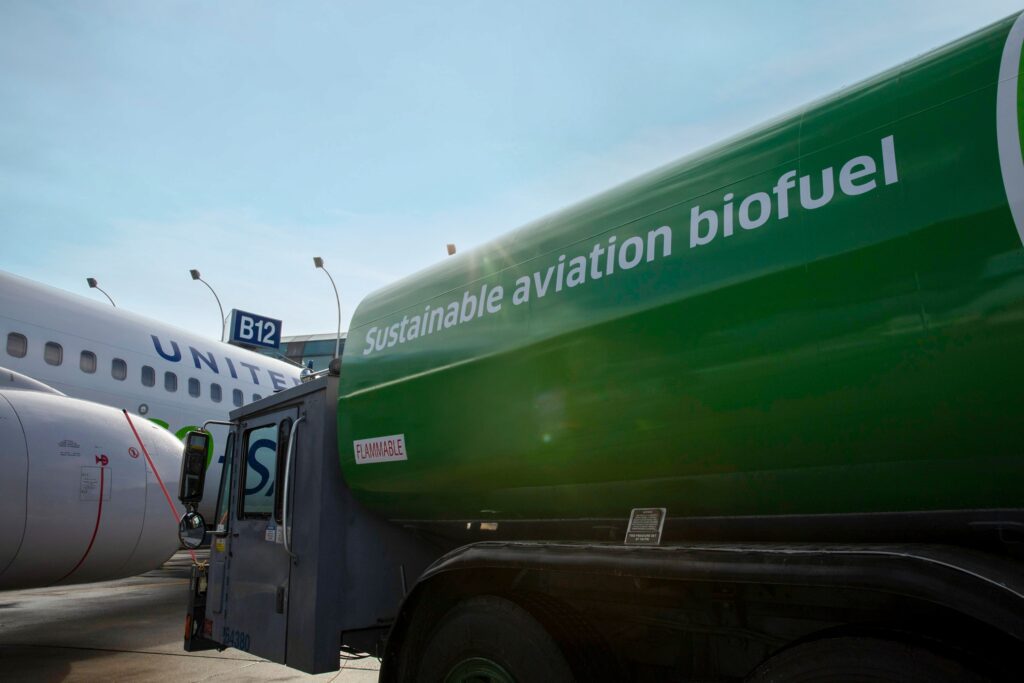(Image Credit: United)
With the planet warming at an increasing clip and having an impact on everything from human health to food and energy security, we need climate solutions—now. Luckily, biotech is already on the case, with companies using biobased and synthetic biology, in particular, to develop low-carbon and sustainable solutions.
On November 2, the Biotechnology Innovation Organization (BIO) hosted a webinar as part of its Climate Policy Innovation Series, “Fueling the Energy Transition.” Moderated by John Torres, BIO’s Director of Federal Government Relations for Agriculture & Environment, speakers included Tom Dower, VP of Public Policy for LanzaTech, and Dave Kettner, President & General Counsel for Virent, Inc.—representatives from two companies who are leading the way in biobased solutions, especially when it comes to the energy transition.
LanzaTech’s vision of a more sustainable world
LanzaTech is a carbon capture and transformation company, with over 400 employees at the intersection of science, engineering, data analytics, and artificial intelligence. With a mission to reduce carbon emissions from some of the hardest-to-abate sectors, LanzaTech recycles carbon waste through its carbon fermentation process.
LanzaTech’s products range from “fabrics and foam for shoes, cleaners, and detergents, as well as the packaging around some of those products, like plastic bottles,” said Dower. However, “one of the most exciting applications of waste carbon products is sustainable aviation fuel or SAF.”
LanzaTech worked with the U.S. Department of Energy to scale the now-ASTM-approved Alcohol to Jet Technology, or ATJ. This technology takes ethanol from the LanzaTech process—or any low-carbon ethanol—and converts it into low-carbon and cleaner burning jet fuel.
Beyond jet fuels, LanzaTech “can accelerate progress on the many chemicals that can be produced via gas fermentation,” Dower noted.
LanzaTech’s “vision of the world” is a circular, “fully transitioned, new carbon economy,” said Dower. “This means a sustainable world where the end of life of one product actually becomes the feedstock for a new product, and on, and on.”
“We see this being broadly applicable across geographies, both in the United States and around the world, creating local economic drivers for sustainable jobs,” continued Dower, “the good middle-class jobs that everybody hopes to have in their society.”
“LanzaTech is trying to show the world there is enough carbon above ground to make everything we need, allowing gas fermentation to take advantage of unique feedstocks and creating product flexibility advantages to enable the circular economy,” he said, “with biotechnology, biomanufacturing, and synthetic biology, coupled with engineering, artificial intelligence, and economics.”
Virent – from university lab to the marketplace
Virent was “founded in 2002 on renewable hydrogen technology discovered at the University of Wisconsin.” Today, the company is working on five different commercial platforms. All of them are based on taking carbohydrates from plants and turning them into usable products on the back end.
The first technology the company is bringing to market is its sugar-to-aromatics (STA) technology, followed by ethanol-to-aromatics technology.
Other technologies are more focused on distillate-type fuel products. “This includes renewable diesel, as well as paraffinic. Sustainable aviation fuel for use in those markets,” said Kettner. Additionally, Virent has the technology to produce hydrogen using sugars from plants.
“The world is looking at how do we green up the aviation industry, knowing that there’s very limited options other than probably moving towards sustainable aviation fuel,” Kettner said. Virent has developed 100% drop-in sustainable aviation jet fuel – “a direct replacement for jet fuel today.”
Back in December 2021, Virent partnered with United Airlines, Boeing, GE Aviation, and other entities to fly the first commercial passenger flight powered by SAF. Operated by United Airlines, the aircraft flew from Chicago O’Hare Airport to Washington, D.C., with passengers on the plane, including Kettner.
“In that plane, one of the engines was flown specifically on 100% drop-in sustainable aviation fuel,” Kettner recalled.
Virent is also bringing to market low-carbon gasoline, utilizing its BioForming process to produce BioForm gasoline. It will have a carbon footprint of at least 70% lower than what you would see with petroleum today, as well as the option to go all the way down to net zero—and possibly lower, depending upon the company’s inputs, according to Kettner.
In the retail space, Virent has partnered with Patagonia to produce the SugarDown Hoody. This is the result of Virent’s 100% biobased polyester being brought to market. Virent also has a long-standing relationship with Coca-Cola to bring to market—at least on a demonstration scale—a 100% plant-based Coke bottle. This bottle is made with biogenic carbon coming out of the atmosphere going through the plants, and then ultimately, into the chemicals used in the products.
The role of government and regulators
Both Dower and Kettner touched on the role of government and regulators in the biotech space.
“I would say government and governments around the world play a huge role at pretty much every stage from early [research and development R & D],” said LanzaTech’s Dower.
Meanwhile, Kettner of Virent said, regarding sustainable aviation fuel, “the government plays a very strong role in making sure that [a] product is properly tested, but then also, you know, is expedited in getting the product to market. And then the second area, obviously, is in supporting the industry as it comes forward.”
Biotech’s ‘time is now’
These were Dower’s optimistic words on the future of the biotech industry.
“Biotech really offers a sort of a path around the engineering challenges of dealing with so many of society’s problems. And it is just so interesting to see it applied in these in these ways that you would never expect it with synthetic biology engineered biology.” Dower added that, “I think biotech’s moment really is here, not just in the U.S., [but] around the world. And I think the question for the U.S. is whether we’re going to grab it and run with it, and own it.”
“This is our opportunity,” concluded Kettner, “and I think that’s where BIO and biotechnology has a place to play. And I think we’re going to get there.”




